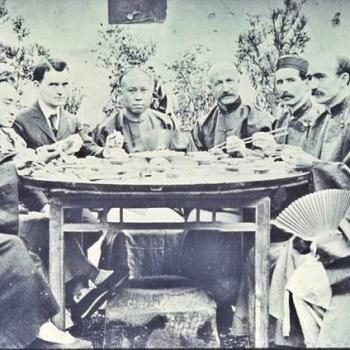The most devastating effects of the coronavirus in America has occurred, and is occurring, amongst those that are the most vulnerable and most invisible in our society: nursing home residents. It is imperative for churches to take up the cause of these individuals and begin to work with governments and institutions to provide for the physical, mental, and spiritual health of nursing home residents and staff.
It appears on the surface to be an oddity: why has so little attention been paid to nursing homes even though the coronavirus has disproportionately affected its residents and staff? In my home state of Pennsylvania, for instance, approximately 60-70 percent of Covid deaths have occurred amongst nursing home and assisted care residents. However, until this past week, Governor Wolf and his administration has spent little time, energy, and resources addressing the manifold ways in which the coronavirus has devasted these facilities. The distribution of testing kits, PPE, or cleaning services, has been overly directed towards hospitals with few Covid patients, and the reporting system for nursing home cases has been convoluted and opaque. Anyone who wishes to know the extent of this neglect and ineptitude should view the PA Senate hearings on these matters, located here.
To those who have worked and ministered in nursing homes, this lack of attention is unsurprising. The emergence of nursing homes is in many ways a manifestation of our society’s obsession with youth and productivity. Worth in our society is proportionately tied to our ability to produce, whether such production manifests itself in career success, monetary wealth, or a fixation on “making a difference” in the world. Those that can produce in these ways receive the spotlight and attention of our communities, our media, and at oftentimes, our churches.
Those with a diminished capacity to produce are sidelined, marginalized, and rendered invisible. The lives of the unwanted and genetically deficient unborn are quietly terminated in windowless hospitals and clinics. The elderly whose bodies have begun to break down are quietly removed from active participation in society and placed in obscure, sterile brick buildings to be ignored by the rest of the community. I often encourage my parishioners to plot their daily work commute on google maps, and then do a search for nursing homes and assisted care facilities that are located along this route. Most are stunned to find that they drive by a number of such homes each day yet know nothing about their existence.
This in no means is meant to denigrate the thousands of loving family members who must make the difficult decisions involved in care for their aging loved ones. Oftentimes, nursing homes are the best options out of a host of difficult ones. The fact that such homes are the only options for many is emblematic of deeper issues within the fabric of modern life: our society is structured socially, politically, and economically around the nuclear family, and prioritizes those who are the most able. Many can continue to have loving relationships with their friends and family members who are aging, but they must do so in the obscurity and invisibility of the modern assisted care facility.
Such invisibility goes a long way in explaining the disparity in coverage of the coronavirus. In mid-March, for instance, media attention was fixed on college-aged Spring Breakers on the Florida beaches, even as the Governor of New York was moving sick coronavirus patients into densely populated nursing homes. The tens of thousands of dead in nursing homes continually take a backseat in the news to the stories of a handful of social distance violators and the tet a tete of politicians.
As Christians, we are called to see those whom the world ignores. The establishment of the deaconate to distribute food to the poor shows the seriousness of this endeavor for Christians—here is, perhaps for the first time in human history, a vocation whose aim is simply to care for those in need. What is an afterthought to the world is made the priority of the Church. We may add to this the beatitudes, Jesus’ great pronouncement that those whom the world denigrates and ignore are revealed to be those whom God favors as blessed. While I want to suggest some practical steps churches can take towards helping out nursing homes at this time, I do believe that the core of the issue lies in our lack of vision. We as Christians need to wake up, and see the homes around us and the sick and dying in our midst. While the culture may not ever shine the spotlight on these people, we need to see them as Jesus does, see them as those whom Jesus proclaims as blessed. Actions will, perhaps naturally, flow from this vision.
Society as a whole has been atrociously behind in doing what is necessary to aid nursing home residents. However, we are still months away from a vaccine, and so there is still time to make changes that can drastically improve the conditions of many of the most vulnerable near us. Here are a few ways in which individual Christians and churches might minister to residents of long-term care facilities right now:
- Provide financial aid for the procurement of sufficient PPE for all nursing home staff and residents throughout the remainder of this outbreak. All this requires is a simple phone call to local nursing homes and an ask of specific need. This need will be particularly acute in states who have not prioritized PPE for nursing homes. Our church has begun a PPE drive for area nursing homes, and this has been an admittedly challenging task. Many nursing homes in our area are underfunded and understaffed, and this means steady and persistent phone calls in order to find out what specifically is most in need. In addition, procuring PPE remains a challenge. However, every facility I have contacted in my county expressed a pressing need for either masks, shields, or gowns. I would encourage churches to make similar contacts in their community.
- Propose creative solutions to engaging with the residents of facilities under quarantine. Many homes are under strict quarantine, and many residents have been cut off from all forms of Christian community. As a result, churches need to be creative in the ways in which they minister. One minister in my denomination is writing pastoral care e-mails that staff can print to give to residents. Our church has begun collecting and donating Ipads so that residents might connect with family members or attend online worship services. I have done window visits with parishioners in nursing homes, in order to talk and share prayer requests.
- Organize online prayer times specifically devoted to praying for local homes and residents. Invite staff and civic leaders to join in prayer. Pray fervently the words of the 91st Psalm, that God would save our elderly from “the plague that stalks in the darkness” and the “sickness that lays waste at mid-day.” In prayer we can also hear from God, and ask that God might give us discerning wisdom regarding the best ways to help those in need.
- In terms of advocacy, contact state congressman and lobby for weekly testing of all nursing home residents and staff. In Pennsylvania, Governor Wolf has finally reversed course and begun universal testing. Other states have started as well, but such policies need to happen nationwide. The consistent prioritization of testing kits to meet this need is also required. Increased funding for regular cleaning services also needs to happen on the state level. Many homes operate on a shoestring budget and lack the resources to afford the type of regular deep cleaning necessary to stave off outbreaks.
We have as a whole been wantonly neglect of those most susceptible to harm during this pandemic. However, there are still many months ahead, and the need for Christians to come alongside nursing home residents remains persistent and dire. I pray we have eyes to see those whom society has rendered invisible, and pray that God might work through His church to protect those who are suffering and deliver them from this deadly pestilence.
Guest post by Michael Niebauer. Michael is pastor of Incarnation Church in State College, PA and Teaching Fellow at Trinity School for Ministry. His area of research is in Christian mission and ethics, and his writings can be found on his website.













